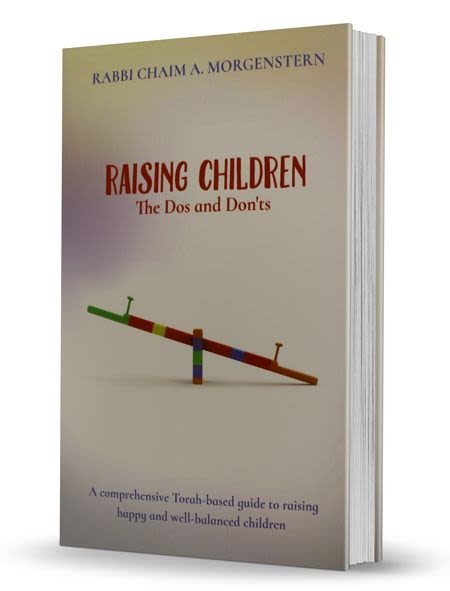
Vayeshev: The Cream of the Crop
Today you can buy a computer that will organize your life, do your taxes, raise your children, and make you a hot cup of coffee to boot...

Our society is all about results. People search for anything that will help them reach their goals quickly and easily. Modern technology exemplifies this phenomenon. Today you can buy a computer that will organize your life, do your taxes, raise your children, and make you a hot cup of coffee to boot. Where once upon a time people used phones to communicate via the spoken word, today's cell phones are equipped with live TV, email, cameras, a drop-down disco ball, a book of witty comebacks and sheepish excuses, and even a wet bar.
For us thirsty consumers, there seems to be a product out there that will fulfill our every need (and a lot of needs we didn’t even know that we had). Not to be a cynic, but it appears that our society is obsessed with finding that spanking new gadget that will turn us from dismal disorganized losers into successful champions of our oh-so-modern lives. This should lead us to ask, does such a thing exist? And if so, where can we buy it? And if it does exist, and we can buy it, how long will it be until next year’s model comes out in a smaller size and in multiple colors?
Throughout history, mankind has been seeking the tools for success, from the wheel, to sliced bread, to the laptop. Based on the number of new products available daily, we can infer that the tool to perfect our lives has not yet been found. Even in 2006, with all the phones, computers, miracle drugs, fat loss pills, longer lasting light bulbs, and more fuel efficient cars, people still crash into the reality that life is a challenge, and failure is, at times, inevitable. But not to depress the reader or to put all the people creating faster computers or more ridiculous fad diets out of business, perhaps we can admit that there is something out there that does guarantee success. Now that everyone is trembling with Daddy’s credit card in hand, we might tame the wild child of consumerism by suggesting that the solution cam be found in this week’s parsha.
A Successful Man
The verse reads, “And God was with Yosef (Joseph) and he became a successful man…” While this may not sound as exciting as a new iPod, this week’s parsha gives us insight into one of our greatest men, and the method through which he attained that greatness. Of course, the first comment that probably comes to the mind of the free-thinking young adult who grew up shouting at their parents, “You just don’t understand me!” has to do with the definition of success, and its seemingly objective nature. For some, success is rolling around in piles of hundred dollar bills. For others, it's muscles the size of household appliances, and yet still others might define success as being famous, powerful, respected, or any other self-centered reason that compel a person into politics. Our holy ancestor, Yosef the Tzaddik achieved all of these things, and still managed to stay morally upright, so much so that he until the present he serves as a pillar of righteousness to the Jewish people and is referred to as Yosef Hatzaddik, Yosef the righteous. Why? Because God was with him!
“Ah,” one might scoff, “Surely Yosef came from a privileged background. He must have gone to private schools and had adoring parents, who constantly pampered him. That’s why he was able to attain what he did. Not like us, who have to work hard for whatever minimal results we achieve.”
God was with Him
Right? Wrong! Although Yosef did closely resemble his saintly father Yaakov (Jacob) both physically and spiritually, his life, like his father’s before him, was by no means easy. Both Yaakov and Yosef had to struggle in this world.
Yosef was torn away from his family at a tender age to be sold into slavery. Once he regained his footing and reach prominence, he was betrayed and thrown into prison. He suffered in ways that many of us will never be able to comprehend, please God. But although he was torn away from his home, became a slave in a foreign land and spent years in a prison cell, he eventually became the second most powerful man in Egypt. How is such a thing possible?
It was possible because God was with him.
Rabbi Shimshon Raphael Hirsch explains that the reason for this was because he was constantly “isolated, expelled and thrown out, so the special care and protection of God was necessary.” Because Yosef lacked the comfort and stability that many people take for granted, he was forced to remain constantly in touch with the only reality – that he must rely on God's mercy to overcome life’s obstacles. Throughout Yosef's life, from the depths of despair to the heights of glory, he recognized the need for Divine assistance. When he was delivered, time and time again, into more favorable circumstances, he never allowed his success to make him arrogant. He attributed all his talents and power to God.
How can we measure Yosef’s success? Among his brothers, Yosef was the most favored in his father’s eyes. As a slave, he rose to become the most trusted worker in his master’s house. In prison, he became a leader. As the interpreter of dreams, he was elevated to unbelievable political heights by Pharaoh, ruler of Egypt. Yosef was like cream in milk; no matter what, he always rose to the top.
A Microcosm of Jewish History
Our Rabbis teach us that Yosef’s life is a microcosm of Jewish history; throughout the ages, wherever they settle, the Jewish people attain wealth, prestige, and power. Despite their prominence, however, they are eventually expelled and forced to begin all over again in a new country. Within a short time, usually following a resurgence of Torah observance, they rise to the top again. The Jews, like Yosef, have the secret to success.
And to think this was all before the modern age of computers and TV. While we struggle to stay adrift of technology, we fall further away from that which can offer us true fulfillment. As life gets easier, we tend to credit ourselves and science for our achievements while blaming our failures on our inability to master the world. Either way, we are missing the point and distancing ourselves from God.
We might think that we have mastered nature; in most cases, our houses can survive the elements, and modern medicine can help us survive most diseases. We might even think that we have mastered ourselves; there isn’t a problem in the world that a self-help book or a therapist couldn’t fix. Yet, with increasing frequency, nature is wrestling control from our grasp. Within one year, the world witnessed a tsunami wipe out South East Asia, a hurricane destroy New Orleans, and earthquakes kill thousands around the world. On the moral and emotional front, the divorce rate continues to skyrocket, more children are bringing violence into the schools, prescriptions for depression are passed out more frequently than mom’s piping hot latkes on Chanukah, and world politics is becoming increasingly precarious. Alas, happiness and control over our environment continues to be elusive. The more we try to limit the threats and upsets of the world, the more it spirals out of control.
We cannot just step back and expect God to fix our world. He gave it to us to perfect and sanctify. At no point did Yosef stop toiling to overcome his ordeals. Yet at the same time, he recognized that it was really in God's hands. He made himself into a vessel for God’s mercy, and he was rewarded with continued accomplishment. While it’s not difficult for us to identify with the idea that life isn’t easy, it’s challenging to comprehend that the solution to our problems can not be bought on E-bay. Through turning his heart to God and working hard, Yosef became a champion of his destiny. As Jews, we have inherited this legacy of enduring triumph. May we merit filling the shoes of this Tzaddikim though our ability to open ourselves up to God’s mercy.










Tell us what you think!
Thank you for your comment!
It will be published after approval by the Editor.